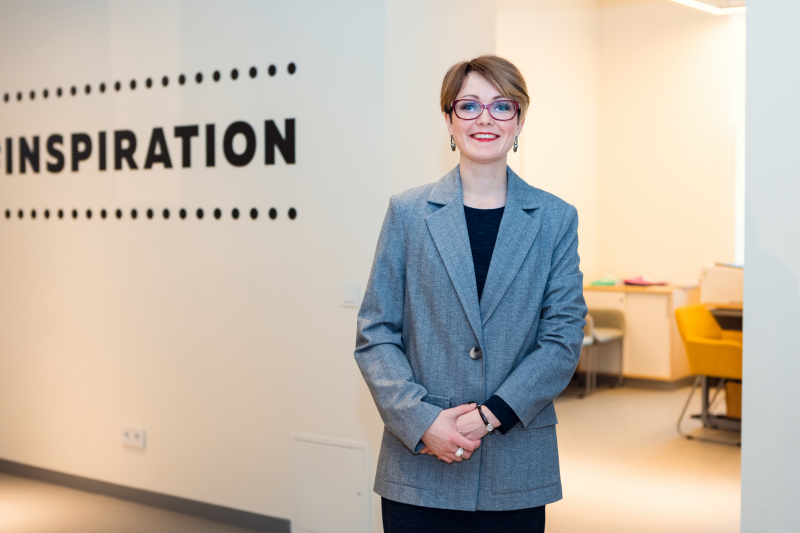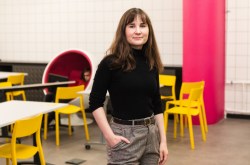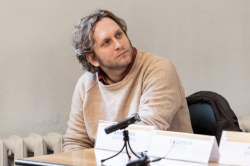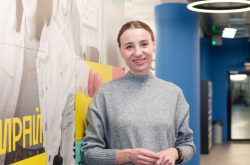How did you start working at ITMO?
In 2008, I began to teach philosophy at St. Petersburg State University. Apart from my classes, I was also engaged in scientific research and was part of the editorial board of the sixth series of the university’s journal, as well as organized student contests for the best scientific papers and supervised scientific projects of philosophy majors. I loved what I did wholeheartedly, so to say, and couldn’t picture my life any different at that moment. However, I decided to quit my job in 2016. There were several reasons behind my decision, including political ones. Yet after this long, I know for sure what happened: I burned out. I got myself to the point where I simply stopped enjoying my work and saw no point in doing all this. And this was unbearable!
Up until 2018, I worked primarily in other fields but also taught a short course in philosophy (in Engish) at St. Petersburg University’s Graduate School of Management. After having done it for two years, I came to realize that philosophy is my calling. Luckily, I never cut myself off the academic community and had the chance to join ITMO right when it was on the lookout for a new philosophy team to bring new teaching strategies into life.
What's the difference between the old and new methods?
First and foremost, the new teaching strategy promotes a brand new look at the mission of teaching philosophy. The course is not so much about learning new concepts and ideas as about exploring your own vision. We want our students to develop flexible critical thinking and thus become more creative and consistent in their work. Another difference is that we strive to go beyond teaching philosophy aside from other fields and try to convey to our students that science and life are full of events that raise philosophical questions. Once students realize that, they can finally see how these skills can help them professionally.
We strive to help our students understand what they are interested in and why, as well as what projects they’d like to do and why they need their studies. The concept of the VUCA (volatility, uncertainty, complexity, and ambiguity) world is all the rage right now. Uncertainty became an integral part of our lives. We are often unclear about our current situations and can’t say what the future holds for us. You have to find yourself in this constantly changing world. It’s no longer enough to master one skill and do it for the rest of your life.
Although the concept may seem new for modern management, it has been, in fact, a typical situation for philosophers since the dawn of time. After all, the purpose of philosophy is not to solve a complex issue once and for all. That’s what science is for. Philosophy is for those tasks that can be solved in multiple ways. A new solution may lead to the birth of a new science. The same way as philosophy gave rise to physics and psychology, for instance.
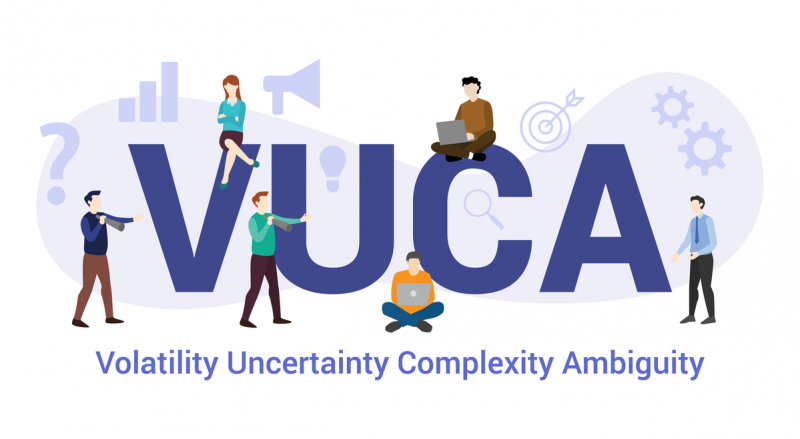
The VUCA world. Credit: depositphotos.com
In fall 2021, you joined ITMO’s Research Center “Strong AI in Industry”, which has recently received the financial support to create a decision support system for planning the development of deposits of natural resources together with Gazprom Neft. What’s your role in this project?
I’m running a research group on the ethics of strong artificial intelligence in the industry. When we deal with AI systems, which, indeed, help us facilitate the process of decision-making, we cannot but face the ethical part of their use. How to consider responsibility and self-sufficiency? What role does AI play in this interaction? All these issues should be addressed and I can think of no one better suited for this than philosophers.
Students, sadly, don’t feel the difference between efficient, ethical, and legal technologies. They often turn to legal norms and market benefits when grappling with ethical issues. The problem is that they don’t realize that moral and ethical discourse is much broader than that of politics and can serve as a basis for its criticism. They don’t think about what values they communicate when choosing this or that solution and whether their actions bring more meaning to today’s social relationships or not.
Anyway, I’m happy to see that more and more students are now concerned about ethics and that I’m doing a good job showing its significance. They start to realize that the ethical part of technologies is indivisible from their safety. After all, we produce products primarily for people and we care about them.
Not only do you teach philosophy and do science but you also head one of the educational modules at the university. How do you manage all these tasks? And what’s the most challenging part of your work?
Believe me, it’s not easy. But I’m a working mom, and I know what self-organization and time management means too well. The funny thing is that I first got in touch with ITMO on the day I had my son. I remember I was worried about what people might think about my motherhood when I was interviewing for the job. Yet I wasn’t treated any differently and was pleasantly surprised by such a professional and welcoming attitude. A month after the birth, I gradually started to work.
Teaching fitted my life perfectly. I always ask my son about his day at kindergarten when I get home and he asks questions about my students. Plus, I often have classes online so he already knows my students and what we do. I got used to a strict schedule, planning two weeks ahead, and even possible rain checks over the past three years. Being a parent is a great way to get rid of procrastination and do what you must right here and right now. It’s great to be in control of your own life.
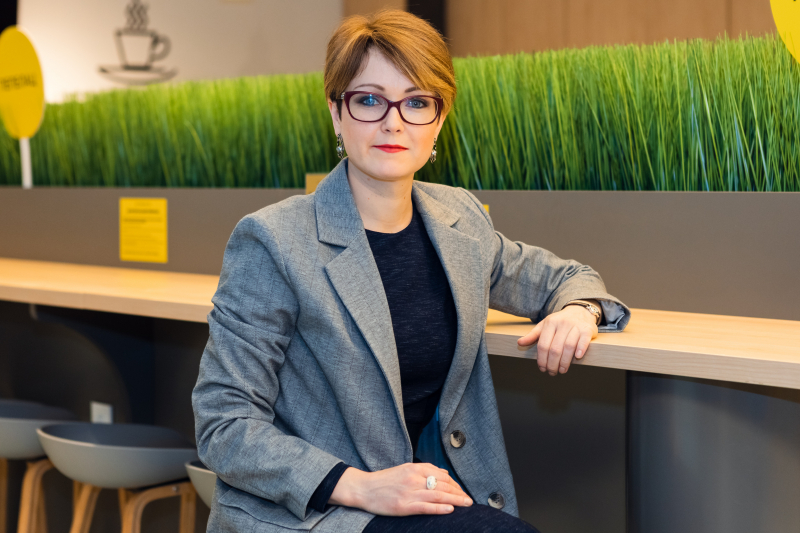
Daria Chirva. Photo by Dmitry Grigoryev / ITMO.NEWS
Probably, the trickiest part of it all is to find time and opportunities to do research because you have to first invest your time and effort into the process and only then, after some time, you will get to finally see the fruits of your labor. When I face a problem I can’t solve, I always try to follow the principles of philosophy. In situations of uncertainty, you should look back on where you began and figure out how you got here and how you can get out. It’s a hard thing to do but it is also very fun.
Sometimes, I ask myself whether I’d like to leave some of my goals behind and live differently or not. So far, it’s been always a no.
What helped you win the competition?
I think the projects I did last year helped me a lot. I created a course taught in English on the analytics of modern science and its relevance jointly with Alexander Gebharter and Christian Feldbacher-Escamilla. Together we also worked on a project called Hard Core Philosophy. This was a rather interesting and unique experience for us. We met and had our first meeting online, and since then we’re doing it this way because of the pandemic.
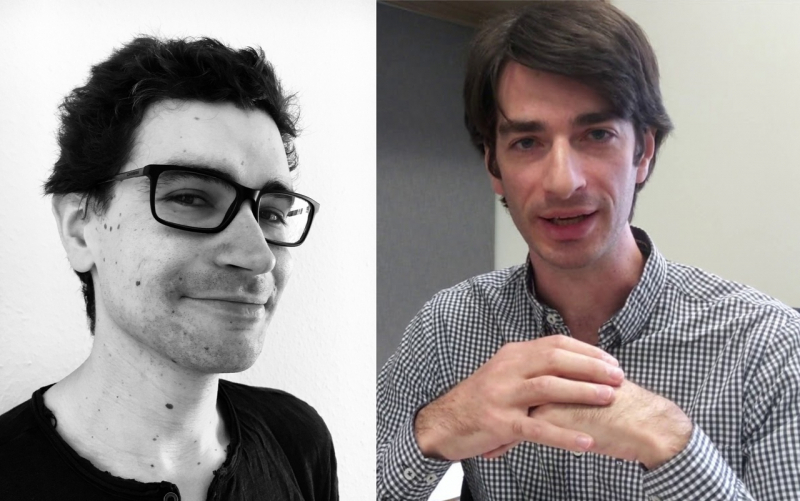
Alexander Gebharter and Christian Feldbacher-Escamilla. Credit: alexandergebharter.com and youtube.com
While working on the course, I also took part in the launching of two educational modules for Master’s students not only as a lecturer but also as a responsible leader. I’d like to thank my colleagues without whom this would not have been possible.
Teaching third-year students is also on my list of achievements. These were future programmers studying under the guidance of ITMO’s IT stars, Alexander Mayatin and Andrey Stankevich. It was rather a challenge to have them interested in my subject because they know for sure what they want, and it’s not philosophy. I don’t want to force my students to be active in class or study books only because they’re in a course curriculum. On the contrary, I want to engage and encourage them to speak up about what they want to do and learn. That’s why I offer a flexible course and always let students decide on the topic of our last class.
What are your thoughts on the contest?
It’s great that ITMO offers such an opportunity for its academic staff. Usually, universities don’t pay much attention to lecturers’ classes. They care more for the number of publications and conferences under your belt. But a good scientist doesn’t necessarily make a good educator. As a result, teachers who are really great in what they’re doing are left unnoticed by the academic community. This competition shows that the educational process here isn’t chaotic but is carried out with the interests of all the groups. Lecturers understand that their work is always appreciated, and it’s a strong boost when you only start teaching.
There are pics of you paragliding on your social media. How did you get into this sport?
Actually, I’m taking a break from paragliding now because it’s something that takes a lot of time and energy. Every paraglider will tell you that you should always keep your eyes open and practice as much as possible. And I can’t do that right now.

Credit: depositphotos.com
It all started when I was on my internship in Massachusetts. Once, I went up to the mountains to only be stunned by the view of the world below: a green plain covered in fresh raindrops and several bright red paragliders flying up in the air. Once I learned about a paragliding club in Leningrad Oblast, I signed up for a tandem flight with an instructor and then started to train to do it on my own. I’ve already done paragliding in Novgorod and Penza regions, Dagestan, Spain, Portugal, Slovenia, France, Turkey, and Nepal.
Paragliding is somehow magical because unlike skydiving, you don’t jump from an aircraft or a mountain to land on the ground, you get to soar in the air. Paragliding equipment isn’t so heavy, so you can easily fit it into your backpack and hike up a mountain. The main thing you need to do after you take off is to follow the rising air carefully reading the surrounding terrain and move from one lift to another like a bird. It’s no problem to cover a distance of several tens of kilometers in mountains or along a plain. The more you practice, the further and longer you can stay up in the sky. Nothing can compare to soaring through the clouds in solitude. It’s what makes philosophy and paragliding so similar. You can only think and fly by yourself. You also need to be fully focused and think clearly no matter what. But in return, you get plenty of pleasure.
